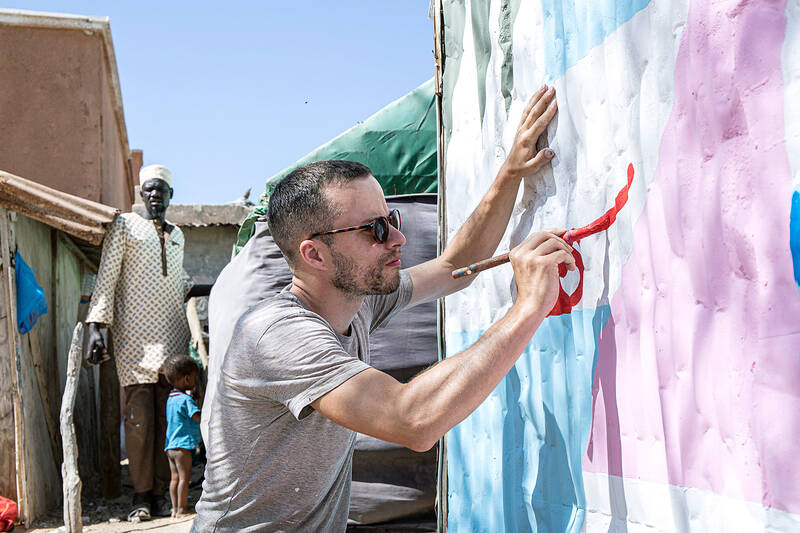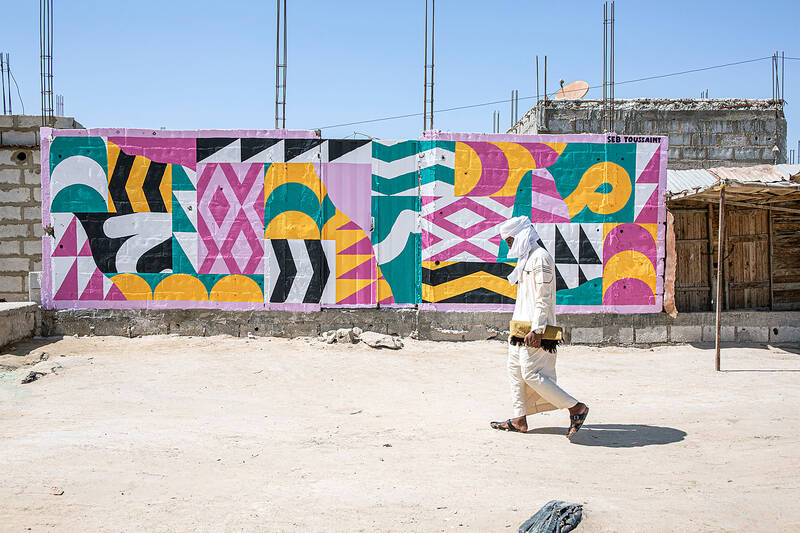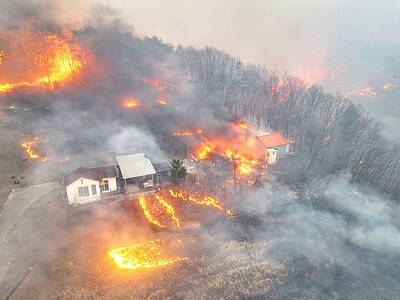For the past decade, artist Seb Toussaint has traveled to some of the poorest parts of the world to paint brightly colored frescoes on the walls of downtrodden neighborhoods.
Dressed in shorts and a T-shirt, the 35-year-old French-British artist, who always paints an inspiring word at the heart of his work, is tackling a piece called Future in a dusty slum on the outskirts of Mauritania’s capital, Nouakchott.
“The goal is to paint the words of those who don’t have a voice,” he said.

Photo: AFP
He and two travel companions have daubed the sides of a sheet-metal shack with a mural of geometric and undulating shapes in white, blue and baby pink.
As they work, children play in the dirt paths, rolling a tire or kicking a ball between makeshift homes, as curious women in colorful veils mill around. Zaatar is a hodgepodge extension of the capital, where fishers, construction workers, carpenters and casual workers have made their homes.
The soil is too salt-laden to be cultivated and there is little greenery aside from two ailing acacia trees.

Photo: AFP
Since 2013, Toussaint has painted walls of cement, wood, and corrugated iron with words in different languages and alphabets as part of his project, which he calls “Share the Word.”
There was Humanity in the Palestinian Territories, Change in Nepal and Freedom in Iraq.
He earns a living painting murals in Europe and saves to finance about two trips a year to spend a month in a slum or refugee camp, where he offers his services to residents. The homeowner decides what word they want highlighted in the mural.
Toussaint started his career painting “tifos” — vibrant choreographed displays held by fans at soccer matches. He decided to dedicate himself to bringing “color to an environment where there is very little,” after he was exposed to the harsh realities some people face while he traveling the world on his bicycle a decade ago.
When he arrived in Zaatar early last month, “we played football with the kids. I explained in broken Arabic that the goal was to paint houses. One person said: ‘I would like you to paint my house.’”
“We have never had anyone turn us down,” he said.
However, there is often an initial reluctance.
“We had our suspicions about their presence, but we quickly realized these guys had good intentions,” said fisherman Amar Mohamed Mahmoud, 52. “They do a good job that brightens up the neighborhood.”
Mahmoud got a rare animal painting, The Camel, in shades of blue and fawn, in honor of the animal that plays an important role in Mauritanian society.
He has painted eight murals in the neighborhood, among them Mum, Youth and Friends, whose colors dazzle in the sun-scorched neighborhood.
He estimates he has painted 222 word murals around the world, with a general fondness for the themes “Peace” and “Love.”
Some of his works last for years, while others are fleeting. Several murals disappeared when a migrant camp in Calais in northern France was dismantled.
The murals also become a backdrop for local music artists to shoot videos, he said.
Once, in Nepal, one of his painted walls was used as a backdrop for a fashion shoot.

DEATH CONSTANTLY LOOMING: Decades of detention took a major toll on Iwao Hakamada’s mental health, his lawyers describing him as ‘living in a world of fantasy’ A Japanese man wrongly convicted of murder who was the world’s longest-serving death row inmate has been awarded US$1.44 million in compensation, an official said yesterday. The payout represents ¥12,500 (US$83) for each day of the more than four decades that Iwao Hakamada spent in detention, most of it on death row when each day could have been his last. It is a record for compensation of this kind, Japanese media said. The former boxer, now 89, was exonerated last year of a 1966 quadruple murder after a tireless campaign by his sister and others. The case sparked scrutiny of the justice system in

DITCH TACTICS: Kenyan officers were on their way to rescue Haitian police stuck in a ditch suspected to have been deliberately dug by Haitian gang members A Kenyan policeman deployed in Haiti has gone missing after violent gangs attacked a group of officers on a rescue mission, a UN-backed multinational security mission said in a statement yesterday. The Kenyan officers on Tuesday were on their way to rescue Haitian police stuck in a ditch “suspected to have been deliberately dug by gangs,” the statement said, adding that “specialized teams have been deployed” to search for the missing officer. Local media outlets in Haiti reported that the officer had been killed and videos of a lifeless man clothed in Kenyan uniform were shared on social media. Gang violence has left

‘HUMAN NEGLIGENCE’: The fire is believed to have been caused by someone who was visiting an ancestral grave and accidentally started the blaze, the acting president said Deadly wildfires in South Korea worsened overnight, officials said yesterday, as dry, windy weather hampered efforts to contain one of the nation’s worst-ever fire outbreaks. More than a dozen different blazes broke out over the weekend, with Acting South Korean Interior and Safety Minister Ko Ki-dong reporting thousands of hectares burned and four people killed. “The wildfires have so far affected about 14,694 hectares, with damage continuing to grow,” Ko said. The extent of damage would make the fires collectively the third-largest in South Korea’s history. The largest was an April 2000 blaze that scorched 23,913 hectares across the east coast. More than 3,000

‘INCREDIBLY TROUBLESOME’: Hours after a judge questioned the legality of invoking a wartime power to deport immigrants, the president denied signing the proclamation The US on Friday said it was terminating the legal status of hundreds of thousands of immigrants, giving them weeks to leave the country. US President Donald Trump has pledged to carry out the largest deportation campaign in US history and curb immigration, mainly from Latin American nations. The order affects about 532,000 Cubans, Haitians, Nicaraguans and Venezuelans who came to the US under a scheme launched in October 2022 by Trump’s predecessor, Joe Biden, and expanded in January the following year. They would lose their legal protection 30 days after the US Department of Homeland Security’s order is published in the Federal